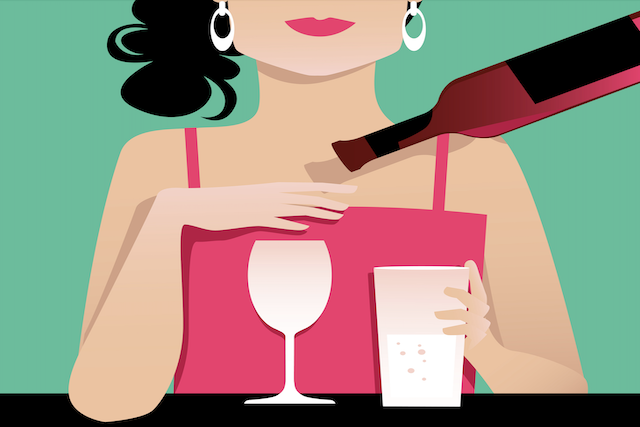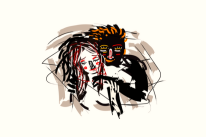
“What is necessary to change a person is to change his awareness of himself.” ~Abraham Maslow
A few years ago I decided to take a break from alcohol, and I also decided I would probably be lonely, miserable, and boring for the duration of my break.
I’d allowed a lot of social conditioning to affect me, and I was sure people who didn’t drink either had no friends, had hit a drastic rock bottom, or had no fun. I didn’t know if I was going to find happiness or even contentment on the other side of my drinking career, and this worried me.
I began to examine those thoughts and feelings around my drinking and brought my behaviors into a sharper focus. It led me to…
Awareness (of my drinking habits)
I look back and can now clearly see that I was, for a very long time, a gray area drinker.
A gray area drinker is someone who falls into the bracket between never drinking and physical alcohol dependency.
Society tends to view problematic drinking in black and white terms. “You’re an alcoholic and you need to be fixed, or you’re not an alcoholic and are therefore okay.” Well, I think it’s more nuanced than that. There’s a spectrum between the extremes of rock bottom and every now and again drinking, and it’s a long spectrum.
A gray area drinker could be consuming a couple of glasses of wine each evening or could be someone who binge drinks on the weekend or someone who can abstain for a month at a time to prove they haven’t got a problem.
I was capable of any of those behaviors, and, looking back, I fit the description of a gray area drinker very neatly. I wasn’t physically dependent on alcohol, but I might have been emotionally dependent. I used it to help me alter my state of mind into relaxation/fun on a regular basis.
This can be a confusing place to be when you first start to see alcohol for what it is. I’d say, “But I’m not doing anyone any harm. I’m sinking a couple of glasses of wine on the sofa, and then I’m going to bed—what’s the problem with that?”
In the past I moved along the gray scale; different ages, different friendship groups, different jobs, different circumstances, different seasons, and different living arrangements all led to different drinking patterns. Apart from the periods in my life where I was pregnant or breastfeeding, I didn’t ever choose to have a really extended time (more than thirty days) away from alcohol.
Acceptance (that I wanted something different)
I came to realize that the more I moved along the grayscale, the more or less colorful other areas of my life became. If my joy was a rainbow, the vibrancy of that rainbow either faded or shone brightly depending on how much I was drinking.
I stopped myself from making a change around my drinking for a long time because I didn’t want anyone to define me as “having a problem.”
The movies would have you believe that the end of your drinking career needs to be very dramatic, with a family intervention and a massive rock bottom, but this doesn’t need to be the case.
What if you chose for your drinking days to end with a quiet fizzle out instead of a big firework or massive drama? That’s how it was for me.
My gray area drinking changed shades of gray over a couple of years, and by the time I was ready to try my alcohol-free life experiment, I was moderating my drinking and never drinking more than two drinks at one time. However, the shades of gray no longer felt good, and I wanted a full-on technicolor rainbow, and I knew that to get one I had to do away with the other—so I did.
Those gray clouds parted, and one by one all the other areas in my life that had, up until then, been a bit less than joyful started to shine a bit brighter.
Action (taking steps toward what was next)
Once I had made the decision to have a break from alcohol for one year, I took action steps to make it more likely to happen.
I set myself up for success by choosing a time frame I wanted to work toward, educating myself on the harm alcohol does, downloading an app to help me to stay focused, looking for other inspiring people who were already doing what I wanted, and asking for support where I needed it.
I had assumed that once I made the decision to have a break from drinking, it would be easy to execute, but I was surprised to find it wasn’t. I realize now that this is one of the reasons there are so many amazing sober communities out there—we need each other, and we want to look out for those who we can serve.
I used to joke that the early days of sobriety constituted a full-time job because I got very focused on a morning routine that supported my needs, I read more than I ever have, I listened to podcasts, and I used distraction techniques in the early days. But actually it wasn’t a full-time job; it was simply learning a new way of being.
Alignment (and a feeling of contentment or peace)
Now that I don’t drink, I’ve had to face some truths. Some of them have been uncomfortable. Some have become less uncomfortable over time, and some, well, they are still uncomfortable.
Deciding to have an alcohol-free year threw me into a bit of an identity crisis. I was mostly okay about changing my home drinking identity but really struggled with my social identity. Shared boozy experiences were a big part of my life and of who I was, or who I thought I was.
I’ve ended up piecing together a bit of a new identity over time. I’ve reflected not only on who I had been but also on who I wanted to be in the future. I took time to explore what I enjoyed and also consciously began to move away from activities I had stopped enjoying.
I also looked more closely at my relationships. Who did I want to see more of, and who did I need to move away from a bit? Some of the most surprising support came from the least expected places.
I discovered that chaos had been a default position for so long that calmness was too unfamiliar. To start with, I had to move slowly toward the identity that I wanted. I’ve accepted that some friendships have changed and some have stayed the same. I’ve also made new friends since becoming sober and a business owner.
Who am I sober? I’m just someone who chooses not to drink alcohol. I want that to be the least interesting thing about me.
Who am I sober? I am an improved version of myself, more relaxed, more peaceful, more patient, kinder, and more content. These were not words I would have used to describe myself when I was drinking. Internal chaos reigned.
Who am I sober? Well, probably the most surprising thing for me is to find myself working as a coach. I spent twelve years as a youth worker, and a large portion of my time was spent talking to young people about their substance use without ever considering my own. When I had gotten sober and completed my coach trainings and certifications, I couldn’t believe what I had achieved. None of this seemed possible a short time ago.
I recognize now that a large part of the “woohoo, let me lead the charge to the pub/bar/dance floor” part of my personality looked like an extrovert but was indeed an introvert using alcohol as a coping mechanism in situations where I didn’t feel comfortable.
I’m really happy to lay claim to my more introvert nature now—let me have all the fun, but please can it be in pairs or small groups, please can it be in the morning or afternoon, and please can I go home and have a lie-down afterward? Thank you!
If you’re struggling to visualize/think about who the sober version of you might be, then follow good role models to get ideas—read books, listen to podcasts, and take action. If you’re thinking of taking someone’s advice, consider if they are currently where you might like to be. Have they been in a similar place to you now, and have you seen them act with care and kindness toward others they are helping?
Sobriety hasn’t been a ‘one and done’ experience for me; it’s been a process over the last few years, and I’m so grateful to acknowledge that I’m still a work in progress, as I believe we all are.
Bring awareness, acceptance, action, and alignment into focus as you go, and it might just make things a little bit easier for you.
About Sarah Williamson
Sarah is the creator of Drink Less; Live Better. She’s a life coach supporting people who've concluded that their drinking is doing them more harm than good. She believes that you don't need to hit rock bottom to decide that change is possible. Sarah works online internationally delivering powerful 1:1 programs. Sign up for free 5 day Drink Less; Live Better experiment here. Drink Less; Live Better Book Published Summer 2023. Facebook / Instagram / podcast.
- Web |
- More Posts













 Though I run this site, it is not mine. It's ours. It's not about me. It's about us. Your stories and your wisdom are just as meaningful as mine.
Though I run this site, it is not mine. It's ours. It's not about me. It's about us. Your stories and your wisdom are just as meaningful as mine. 